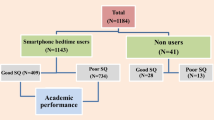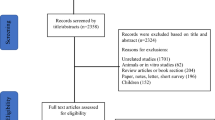Abstract
Background
The impact of carotenoid intake on the risk of mental disorders and poor sleep quality is unclear. Thus, we sought to examine the association between carotenoid intake, mental health, and sleep quality among university students.
Methods
A total of 368 healthy university students (181 men, 49%), aged 18 to 43 years, volunteered for this study. Dietary intake, physical activity, sleep quality, mental health, and body mass index (BMI) were evaluated. A multivariable logistic regression analysis test was used to estimate the odds ratio (OR) and 95% confidence interval (CI).
Results
The mean age of the participants was 22.9 ± 3.9 years and mean BMI was 23.1 ± 3.8 kg/m2. The students in the highest quartile of carotenoid intake had a significantly lower risk of poor sleep quality (OR = 0.19, 95% CI: 0.09 to 0.40; P < 0.001) and depression (OR = 0.27, 95% CI: 0.12 to 0.59; P = 0.001). In the sex-stratified subgroup analysis, the depression risk was significant for men (OR = 0.28, 95% CI: 0.07 to 0.59; P = 0.007), but not for women. Furthermore, we did not observe any specific relationship between carotenoid intake and the risk of anxiety or stress.
Conclusion
It appears that the students with higher carotenoid intake may have a better quality of sleep and lower risk of depression. More longitudinal and in-depth qualitative and quantitative research, with a longer-term follow-up, is needed to support the veracity of our findings.
Similar content being viewed by others
References
Arnett J (2014) The winding road from the late teens through the twenties: emerging adulthood. Oxford University Press, New York
Evans NJ, Forney DS, Guido FM, Patton LD, Renn KA (2009) Student development in college: theory, research, and practice. Wiley
Ibrahim AK, Kelly SJ, Adams CE, Glazebrook C (2013) A systematic review of studies of depression prevalence in university students. J Psychiatr Res 47(3):391–400
Ribeiro IJ, Pereira R, Freire IV, de Oliveira BG, Casotti CA, Boery EN (2018) Stress and quality of life among university students: a systematic literature review. Health Professions Educ 4(2):70–77
Macaskill A (2013) The mental health of university students in the United Kingdom. Br J Guid Couns 41(4):426–441
Cellini N, Menghini L, Mercurio M, Vanzetti V, Bergamo D, Sarlo M (2020) Sleep quality and quantity in Italian University students: an actigraphic study. Chronobiol Int 37(11):1538–1551
Lo SM, Wong HC, Lam CY, Shek DT (2020) Common mental health challenges in a university context in Hong Kong: a study based on a review of medical records. Appl Res Qual Life 15(1):207–218
Said D, Kypri K, Bowman J (2013) Risk factors for mental disorder among university students in Australia: findings from a web-based cross-sectional survey. Soc Psychiatry Psychiatr Epidemiol 48(6):935–944
Ye Y-l, Wang P-g, Qu G-c, Yuan S, Phongsavan P, He Q-q (2016) Associations between multiple health risk behaviors and mental health among Chinese college students. Psychol Health Med 21(3):377–385
Lazarevich I, Irigoyen-Camacho ME, del Consuelo V-A (2013) Obesity, eating behaviour and mental health among university students in Mexico City. Nutr Hosp 28(6):1892–1899
El Ansari W, Adetunji H, Oskrochi R (2014) Food and mental health: relationship between food and perceived stress and depressive symptoms among university students in the United Kingdom. Cent Eur J Public Health 22(2):90–97
Aldiabat KM, Matani N, Navenec C (2014) Mental health among undergraduate university students: a background paper for administrators, educators and healthcare providers. Univ J Public Health 2(8):209–214
Jahrami H, Al-Mutarid M, Penson PE, Faris A-I, Saif Z, Hammad L (2020) Intake of caffeine and its association with physical and mental health status among university students in Bahrain. Foods 9(4):473
Matsui K, Komada Y, Nishimura K, Kuriyama K, Inoue Y (2020) Prevalence and associated factors of nocturnal eating behavior and sleep-related eating disorder-like behavior in Japanese young adults: results of an internet survey using munich parasomnia screening. J Clin Med 9(4):1243
Britton G (2020) Carotenoid research: history and new perspectives for chemistry in biological systems. Biochim Biophys Acta (BBA)-Mol Cell Biol Lipids 158699
Ge H, Yang T, Sun J, Zhang D (2020) Associations between dietary carotenoid intakes and the risk of depressive symptoms. Food Nutr Res 64
Stringham JM, Stringham NT, O’Brien KJ (2017) Macular carotenoid supplementation improves visual performance, sleep quality, and adverse physical symptoms in those with high screen time exposure. Foods 6(7):47
Li D, Li Y (2019) Associations of α-carotenoid and β-carotenoid with depressive symptoms in late midlife women. J Affect Disord 256:424–430
Prohan M, Amani R, Nematpour S, Jomehzadeh N, Haghighizadeh MH (2014) Total antioxidant capacity of diet and serum, dietary antioxidant vitamins intake, and serum hs-CRP levels in relation to depression scales in university male students. Redox Rep 19(3):133–139
Milaneschi Y, Bandinelli S, Penninx BW, Corsi AM, Lauretani F, Vazzana R, Semba RD, Guralnik JM, Ferrucci L (2012) The relationship between plasma carotenoids and depressive symptoms in older persons. World J Biol Psychiatry 13(8):588–598
Grandner MA, Jackson N, Gerstner JR, Knutson KL (2014) Sleep symptoms associated with intake of specific dietary nutrients. J Sleep Res 23(1):22–34
Beydoun MA, Gamaldo AA, Canas JA, Beydoun HA, Shah MT, McNeely JM, Zonderman AB (2014) Serum nutritional biomarkers and their associations with sleep among US adults in recent national surveys. PLoS ONE 9(8):e103490
Boozari B, Saneei P, Safavi SM (2020) Association between sleep duration and sleep quality with sugar and sugar-sweetened beverages intake among university students. Sleep Breath 1–8
Hu FB, Rimm E, Smith-Warner SA, Feskanich D, Stampfer MJ, Ascherio A, Sampson L, Willett WC (1999) Reproducibility and validity of dietary patterns assessed with a food-frequency questionnaire. Am J Clin Nutr 69(2):243–249
Islami A, Mahmoud A, Khabiri M, Najafian R (2013) The role of socio-economic (SES) in motivating citizen participation in sport recreational. J Appl Res Sport Manag 2(3):104–189
Asghari G, Rezazadeh A, Hosseini-Esfahani F, Mehrabi Y, Mirmiran P, Azizi F (2012) Reliability, comparative validity and stability of dietary patterns derived from an FFQ in the Tehran Lipid and Glucose Study. Br J Nutr 108(6):1109–1117. https://doi.org/10.1017/s0007114511006313
Ghaffarpour M, Houshiar-Rad A, Kianfar H (1999) The manual for household measures, cooking yields factors and edible portion of foods. Tehran: Nashre Olume Keshavarzy 7(213):42–58
Buysse DJ, Reynolds CF III, Monk TH, Berman SR, Kupfer DJ (1989) The Pittsburgh Sleep Quality Index: a new instrument for psychiatric practice and research. Psychiatry Res 28(2):193–213
Henry JD, Crawford JR (2005) The short-form version of the Depression Anxiety Stress Scales (DASS-21): construct validity and normative data in a large non-clinical sample. Br J Clin Psychol 44(2):227–239
Sahebi A, Asghari M, Salari R (2005) Validation of depression, anxiety and stress scale (DASS-21) for an Iranian population. J Iranian Psychol 1(4):299–310. [in Persian] 7. Carson BV. Mental health nursing 2
Gomez F (2016) A guide to the depression, anxiety and stress scale (DASS 21). Central and Eastern Sydney primary health networks
Murshid NS, Irish A (2021) Mapping the association between exposure to violence and mental health problems among a representative sample of youth in Bangladesh. Child Youth Serv Rev 120. https://doi.org/10.1016/j.childyouth.2020.105712
Lee PH, Macfarlane DJ, Lam TH, Stewart SM (2011) Validity of the International Physical Activity Questionnaire Short Form (IPAQ-SF): a systematic review. Int J Behav Nutr Phys Act 8:115. https://doi.org/10.1186/1479-5868-8-115
Yang T-H, Chen YC, Ou T-H, Chien Y-W (2020) Dietary supplement of tomato can accelerate urinary aMT6s level and improve sleep quality in obese postmenopausal women. Clin Nutr 39(1):291–297
Peuhkuri K, Sihvola N, Korpela R (2012) Diet promotes sleep duration and quality. Nutr Res 32(5):309–319
Rezai M, Mahmoodi M, Kaeidi A, Karimabad MN, Khoshdel A, Hajizadeh MR (2018) Effect of crocin carotenoid on BDNF and CREB gene expression in brain ventral tegmental area of morphine treated rats. Asian Pac J Trop Biomed 8(8):387–393
Fathalipour M, Fathalipour H, Safa O, Nowrouzi-Sohrabi P, Mirkhani H, Hassanipour S (2020) The therapeutic role of carotenoids in diabetic retinopathy: a systematic review. Diabetes Metab Syndr Obes 13:2347
Wang J, Li L, Wang Z, Cui Y, Tan X, Yuan T, Liu Q, Liu Z, Liu X (2018) Supplementation of lycopene attenuates lipopolysaccharide-induced amyloidogenesis and cognitive impairments via mediating neuroinflammation and oxidative stress. J Nutr Biochem 56:16–25
Bohn T (2019) Carotenoids and markers of oxidative stress in human observational studies and intervention trials: implications for chronic diseases. Antioxidants 8(6):179
Lin H-Y, Huang B-R, Yeh W-L, Lee C-H, Huang S-S, Lai C-H, Lin H, Lu D-Y (2014) Antineuroinflammatory effects of lycopene via activation of adenosine monophosphate-activated protein kinase-α1/heme oxygenase-1 pathways. Neurobiol Aging 35(1):191–202. https://doi.org/10.1016/j.neurobiolaging.2013.06.020
Kawata A, Murakami Y, Suzuki S, Fujisawa S (2018) Anti-inflammatory activity of β-carotene, lycopene and tri-n-butylborane, a scavenger of reactive oxygen species. in vivo 32(2):255–264
Ucci M, Di Tomo P, Tritschler F, Cordone VG, Lanuti P, Bologna G, Di Silvestre S, Di Pietro N, Pipino C, Mandatori D (2019) Anti-inflammatory role of carotenoids in endothelial cells derived from umbilical cord of women affected by gestational diabetes mellitus. Oxidative medicine and cellular longevity 2019
Barros MP, Rodrigo MJ, Zacarias L (2018) Dietary carotenoid roles in redox homeostasis and human health. J Agric Food Chem 66(23):5733–5740
Chen D, Huang C, Chen Z (2019) A review for the pharmacological effect of lycopene in central nervous system disorders. Biomed Pharmacother 111:791–801
Yuan L, Qu Y, Li Q, An T, Chen Z, Chen Y, Deng X, Bai D (2020) Protective effect of astaxanthin against La2O3 nanoparticles induced neurotoxicity by activating PI3K/AKT/Nrf-2 signaling in mice. Food Chem Toxicol 144:111582
Nouri M, Nasr-Esfahani MH, Tarrahi MJ, Amani R (2020) The effect of lycopene supplementation on mood status and quality of life in infertile men: a randomized, double-blind, placebo-controlled clinical trial. Int J Fertil Steril 14(1):17–22. https://doi.org/10.22074/ijfs.2020.5888
Stringham NT, Holmes PV, Stringham JM (2018) Supplementation with macular carotenoids reduces psychological stress, serum cortisol, and sub-optimal symptoms of physical and emotional health in young adults. Nutr Neurosci 21(4):286–296
Funding
This study was funded by a grant from the Isfahan University of Medical Sciences (no.397386).
Author information
Authors and Affiliations
Contributions
BB, PS, and SMS contributed to conception. SMS, BB, and SM contributed to design. FH contributed to statistical analysis. BB and Sh-N contributed to data collection. BB, SM, and CC contributed to manuscript drafting.
Corresponding author
Ethics declarations
Ethics approval
This work was confirmed by the research council and ethical committee of Isfahan University of Medical Sciences, Isfahan, Iran (Ethical code, IR.MUI.Research.REC.1397. 245).
Consent to participate
All participants signed written informed consent.
Competing interests
The authors declare no competing interests.
Additional information
Publisher's note
Springer Nature remains neutral with regard to jurisdictional claims in published maps and institutional affiliations.
Rights and permissions
About this article
Cite this article
Boozari, B., Moradi, S., Heydarpour, F. et al. The association between carotenoid intake, mental health, and sleep quality among university students. Sleep Breath 26, 829–837 (2022). https://doi.org/10.1007/s11325-021-02420-1
Received:
Revised:
Accepted:
Published:
Issue Date:
DOI: https://doi.org/10.1007/s11325-021-02420-1




